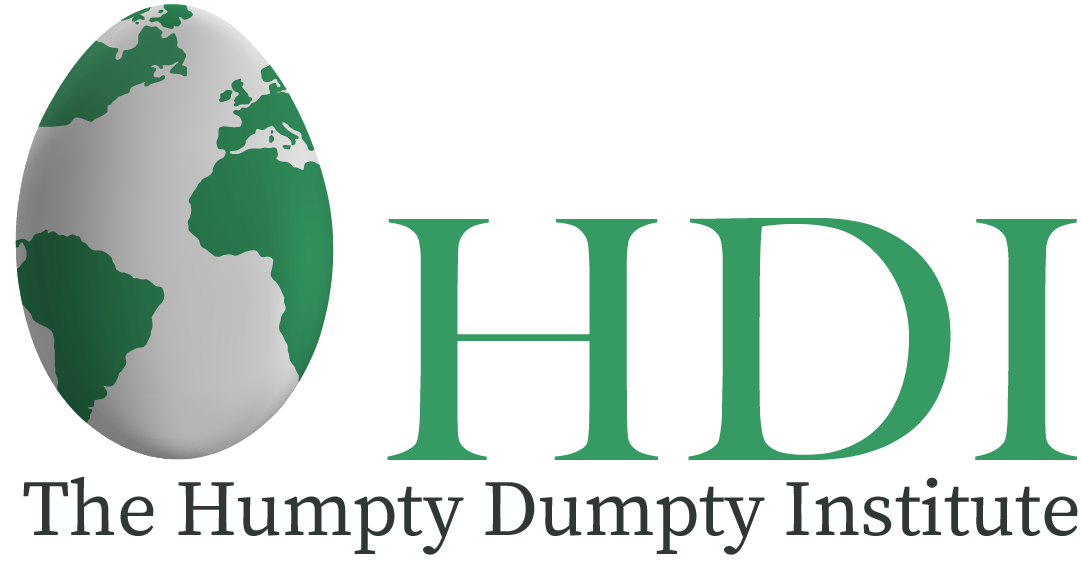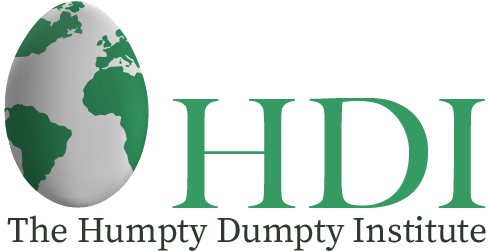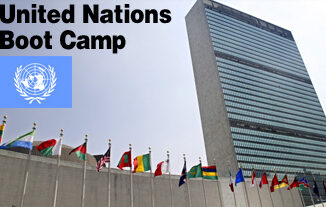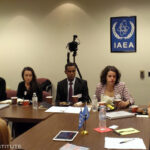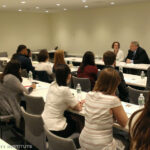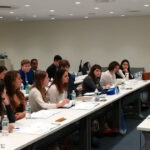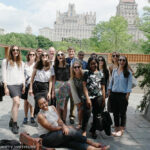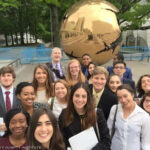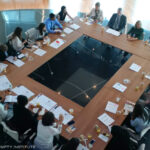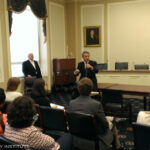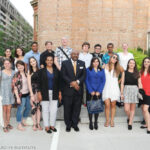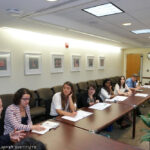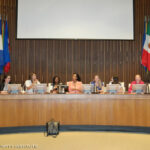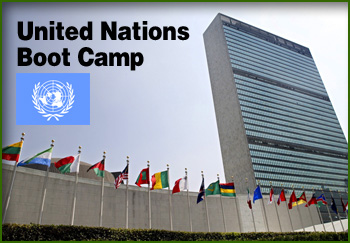 The Humpty Dumpty Institute’s annual United Nations Boot Camp took place this year from June 7 – June 13, 2015 and was a huge success. Seventeen participants from seven countries (Australia, China, Ethiopia, Liberia, Sudan, Turkey and the United States) representing fourteen universities took part in HDI’s signature higher education program. HDI’s United Nations Boot Camp helps create the next generation of global leaders by connecting students with the United Nations and by building bridges between the international body and universities around the world. The UN Boot Camp provides a comprehensive range of activities, resources and opportunities for students to gain hands-on experience in global affairs. It is a week-long immersion study program that gives advanced undergraduate and graduate students the opportunity to explore, examine and experience the inner workings of world’s premier global governance body – the United Nations – as well as other international NGO’s and organizations. By the end of the Boot Camp students gained first-hand knowledge of how multilateral diplomacy is crafted and implemented, not from their textbooks, but by the practitioners themselves, senior UN officials, Ambassadors, members of the UN Diplomatic Corps, UN agency and NGO staff, American legislators and diplomats, policymakers and other leading experts in world affairs. Key topics covered include peace and security, refugees and migration, food security, counter terrorism, gender equality, international public health, wildlife conservation, peacebuilding and peacekeeping, the role of intelligence in international diplomacy, inclusion of civil society, human rights, governance, and legislative involvement in foreign policy. A significant amount of time was also devoted to internships and career development. Participants are able to ask speakers how they arrived at their given career path and begin to explore how they can find their own.
The Humpty Dumpty Institute’s annual United Nations Boot Camp took place this year from June 7 – June 13, 2015 and was a huge success. Seventeen participants from seven countries (Australia, China, Ethiopia, Liberia, Sudan, Turkey and the United States) representing fourteen universities took part in HDI’s signature higher education program. HDI’s United Nations Boot Camp helps create the next generation of global leaders by connecting students with the United Nations and by building bridges between the international body and universities around the world. The UN Boot Camp provides a comprehensive range of activities, resources and opportunities for students to gain hands-on experience in global affairs. It is a week-long immersion study program that gives advanced undergraduate and graduate students the opportunity to explore, examine and experience the inner workings of world’s premier global governance body – the United Nations – as well as other international NGO’s and organizations. By the end of the Boot Camp students gained first-hand knowledge of how multilateral diplomacy is crafted and implemented, not from their textbooks, but by the practitioners themselves, senior UN officials, Ambassadors, members of the UN Diplomatic Corps, UN agency and NGO staff, American legislators and diplomats, policymakers and other leading experts in world affairs. Key topics covered include peace and security, refugees and migration, food security, counter terrorism, gender equality, international public health, wildlife conservation, peacebuilding and peacekeeping, the role of intelligence in international diplomacy, inclusion of civil society, human rights, governance, and legislative involvement in foreign policy. A significant amount of time was also devoted to internships and career development. Participants are able to ask speakers how they arrived at their given career path and begin to explore how they can find their own.
The Boot Camp begins in New York City and finishes the week in Washington, D.C., making the Humpty Dumpty Institute (HDI) the only organization in the country that structures its program in this capacity. Participants heard from over 25 different experts from the United Nations, the State Department, think tanks and other international organizations.
Participants related how the experience at the Boot Camp changed their outlook on the United Nations and made them reflect on their future career choices. Boot Camp participant Stephanie Eyre, studying international public health at Tulane University, stated that “the program turned out to be everything I was hoping it would be and so much more! I learned so much about the United Nations in addition to learning about myself and the type of career I believe I will thrive best in.” Zoe Stathis, an International Relations student at the Royal Melbourne Institute of Technology in Australia, said that the Boot Camp “was honestly the best week of my life. The knowledge and experience that I gained was more than I ever could have expected.”
Day One
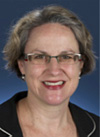 The Boot Camp opened on Monday, June 8 with a full day of briefings at United Nations Headquarters. After a tour of the Secretariat and General Assembly buildings on the UN headquarters campus, the Deputy Permanent Representative of Australia to the UN, Ambassador Caitlin Wilson started off the week by situating participants in the historical, political and physical space of the UN. Ambassador Wilson touched on the specifics of the UN’s founding and organization and included a discussion of what the UN is and is not. She concluded her remarks by commenting on the work before the Australian Mission to the UN highlighting its position as the 12th largest contributor to both the UN regular and peacekeeping budgets.
The Boot Camp opened on Monday, June 8 with a full day of briefings at United Nations Headquarters. After a tour of the Secretariat and General Assembly buildings on the UN headquarters campus, the Deputy Permanent Representative of Australia to the UN, Ambassador Caitlin Wilson started off the week by situating participants in the historical, political and physical space of the UN. Ambassador Wilson touched on the specifics of the UN’s founding and organization and included a discussion of what the UN is and is not. She concluded her remarks by commenting on the work before the Australian Mission to the UN highlighting its position as the 12th largest contributor to both the UN regular and peacekeeping budgets.
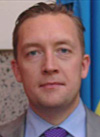 In keeping with current topics before the UN, the next briefer was Mattias Sundholm, Communications Adviser to the United Nations Security Council Counter Terrorism Committee Executive Directorate (CTED). Mr. Sundholm started his presentation by asking the audience for a definition of terrorism. Most defined it as the use of violence and intimidation in the pursuit of political aims that deprive people from living their everyday way of life. The phrase “one man’s terrorist is another man’s freedom fighter” is often used to talk about terrorism but like most clichés is best avoided as there is no internationally agreed definition of terrorism. He stated that today we see these acts of violence carried out in several regions and countries, Afghanistan and Pakistan, Iraq and Syria, Yemen, Egypt, Libya, Tunisia and North Africa, Israel and the Occupied Territories, Nigeria and Somalia to name only a few that have recently made headlines. Mr. Sundholm said that the role of the United Nations in countering terrorism began in the early 1990s, but it was the events of September 11, 2001 that spurred it to make a substantial commitment. The Committee requested countries to implement a number of measures intended to enhance their legal and institutional ability to counter terrorist activities at home and around the world. Recent developments in the United Nations fight against terrorism were also touched on by Mr. Sundholm including the recent Security Council resolution in September 2014, which called on member states to cooperate on preventing the international flow of terrorist fighters to and from conflict zones. In the Q&A session, questions were asked about how the international community might be able to stop the spread of radicalization of young Muslims. Mr. Sundholm stated that several countries are looking at youth employment programs, better, more tolerant Islamic education, and closer surveillance by security agencies of what is being said on social media. Another questioner asked how the current flow of fighters could be stopped given the challenges in prosecution of potential fighters. Mr. Sundholm said that the most immediate way was to follow the money and stem its flow at the source to deny ISIS/ISIL material support.
In keeping with current topics before the UN, the next briefer was Mattias Sundholm, Communications Adviser to the United Nations Security Council Counter Terrorism Committee Executive Directorate (CTED). Mr. Sundholm started his presentation by asking the audience for a definition of terrorism. Most defined it as the use of violence and intimidation in the pursuit of political aims that deprive people from living their everyday way of life. The phrase “one man’s terrorist is another man’s freedom fighter” is often used to talk about terrorism but like most clichés is best avoided as there is no internationally agreed definition of terrorism. He stated that today we see these acts of violence carried out in several regions and countries, Afghanistan and Pakistan, Iraq and Syria, Yemen, Egypt, Libya, Tunisia and North Africa, Israel and the Occupied Territories, Nigeria and Somalia to name only a few that have recently made headlines. Mr. Sundholm said that the role of the United Nations in countering terrorism began in the early 1990s, but it was the events of September 11, 2001 that spurred it to make a substantial commitment. The Committee requested countries to implement a number of measures intended to enhance their legal and institutional ability to counter terrorist activities at home and around the world. Recent developments in the United Nations fight against terrorism were also touched on by Mr. Sundholm including the recent Security Council resolution in September 2014, which called on member states to cooperate on preventing the international flow of terrorist fighters to and from conflict zones. In the Q&A session, questions were asked about how the international community might be able to stop the spread of radicalization of young Muslims. Mr. Sundholm stated that several countries are looking at youth employment programs, better, more tolerant Islamic education, and closer surveillance by security agencies of what is being said on social media. Another questioner asked how the current flow of fighters could be stopped given the challenges in prosecution of potential fighters. Mr. Sundholm said that the most immediate way was to follow the money and stem its flow at the source to deny ISIS/ISIL material support.
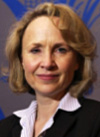 Bettina Luescher, Senior Communications Officer at the World Food Programme was the next briefer and began with an overview of how WFP carries out its mandate responding to conflict situations around the world. Food aid is essential for social and humanitarian protection. To the extent possible, the provision of relief food aid is coordinated with relief assistance provided by other humanitarian organizations and governments. In this way, WFP is well placed to play a major role in the continuum from emergency relief to development. WFP gives priority to supporting disaster prevention, preparedness and mitigation and post-disaster rehabilitation activities as part of development programs. Emergency assistance is used to the extent possible to serve both relief and development purposes. Targeted interventions are needed to help to improve the lives of the poorest people – people who, either permanently or during crisis periods, are unable to produce enough food or do not have the resources to otherwise obtain the food that they and their households require for active lives. In this way, WFP uses food aid to support economic and social development; meet refugee and other emergency food needs, and the associated logistics support; and promote world food security in accordance with the recommendations of the United Nations. Ms. Luescher then went on to speak of the immense fundraising challenges of the World Food Programme. In 2015 on average, WFP has had to raise some $25 million a week to meet demand. Some $7 to $10 million of this has been for Syria alone. Current emergencies there and in Iraq, Central African Republic, Nigeria and South Sudan make up most of the other emergency programs currently being addressed by WFP making this year’s budget ask approximately $7 billion. The United States is the major donor, providing almost a quarter of that amount.
Bettina Luescher, Senior Communications Officer at the World Food Programme was the next briefer and began with an overview of how WFP carries out its mandate responding to conflict situations around the world. Food aid is essential for social and humanitarian protection. To the extent possible, the provision of relief food aid is coordinated with relief assistance provided by other humanitarian organizations and governments. In this way, WFP is well placed to play a major role in the continuum from emergency relief to development. WFP gives priority to supporting disaster prevention, preparedness and mitigation and post-disaster rehabilitation activities as part of development programs. Emergency assistance is used to the extent possible to serve both relief and development purposes. Targeted interventions are needed to help to improve the lives of the poorest people – people who, either permanently or during crisis periods, are unable to produce enough food or do not have the resources to otherwise obtain the food that they and their households require for active lives. In this way, WFP uses food aid to support economic and social development; meet refugee and other emergency food needs, and the associated logistics support; and promote world food security in accordance with the recommendations of the United Nations. Ms. Luescher then went on to speak of the immense fundraising challenges of the World Food Programme. In 2015 on average, WFP has had to raise some $25 million a week to meet demand. Some $7 to $10 million of this has been for Syria alone. Current emergencies there and in Iraq, Central African Republic, Nigeria and South Sudan make up most of the other emergency programs currently being addressed by WFP making this year’s budget ask approximately $7 billion. The United States is the major donor, providing almost a quarter of that amount.
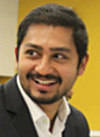 The Department of Peacekeeping Operations (DPKO) was the focus of the next briefing. Suhail Khan, Women, Peace and Security Officer in the Division for Policy, Evaluation and Training at DPKO addressed UN governing frameworks through which a peacekeeping mission can be authorized by the Security Council and explained the role of UN peacekeepers to monitor and observe peace processes in post-conflict areas and assist ex-combatants in implementing peace agreements. Peacekeeping assistance comes in many forms, including confidence-building measures, power-sharing arrangements, electoral support, strengthening the rule of law, and economic and social development. Mr. Khan touched on how peacekeeping operations are called upon not only to maintain peace and security, but also to facilitate the political process, protect civilians, assist in the disarmament, demobilization and reintegration of former combatants; support the organization of elections, protect and promote human rights and assist in restoring the rule of law. He then went on to speak briefly about the 16 current peacekeeping missions authorized by the Security Council from the oldest, begun in 1948 in the Middle East to the most recent in the Central African Republic in April, 2014.
The Department of Peacekeeping Operations (DPKO) was the focus of the next briefing. Suhail Khan, Women, Peace and Security Officer in the Division for Policy, Evaluation and Training at DPKO addressed UN governing frameworks through which a peacekeeping mission can be authorized by the Security Council and explained the role of UN peacekeepers to monitor and observe peace processes in post-conflict areas and assist ex-combatants in implementing peace agreements. Peacekeeping assistance comes in many forms, including confidence-building measures, power-sharing arrangements, electoral support, strengthening the rule of law, and economic and social development. Mr. Khan touched on how peacekeeping operations are called upon not only to maintain peace and security, but also to facilitate the political process, protect civilians, assist in the disarmament, demobilization and reintegration of former combatants; support the organization of elections, protect and promote human rights and assist in restoring the rule of law. He then went on to speak briefly about the 16 current peacekeeping missions authorized by the Security Council from the oldest, begun in 1948 in the Middle East to the most recent in the Central African Republic in April, 2014.
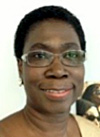 The final session of the first day was given by Dr. Patience Stephens, Director of the Intergovernmental Support Division (IGSD) of UN Women. Dr. Stephens started by speaking of the difficulties in creating UN Women, the full name of which is the United Nations Entity for Gender Equality and the Empowerment of Women. The creation of UN Women came about as part of the UN reform agenda, bringing together resources and mandates for greater impact. In creating the organization, UN Member States took a historic step in accelerating the UN’s goals on gender equality and the empowerment of women. The main roles of UN Women are; to support inter-governmental bodies, such as the Commission on the Status of Women, in their formulation of policies, global standards and norms; to help Member States to implement these standards, standing ready to provide suitable technical and financial support to those countries that request it; to forge effective partnerships with civil society, and: to lead and coordinate the UN system’s work on gender equality as well as promote accountability, including through regular monitoring of system-wide progress. She concluded her remarks by speaking about UN Women’s “HeforShe” campaign which calls on men and boys worldwide to join the movement for gender equality. The campaign aims to kick-start a global solidarity movement in support of women’s rights and full equality between women and men. “HeForShe” will put men at the center of activism and dialogue to end persistent inequalities faced by women and girls around the world. The campaign intends to mobilize one billion men and boys as advocates and agents of change for gender equality.
The final session of the first day was given by Dr. Patience Stephens, Director of the Intergovernmental Support Division (IGSD) of UN Women. Dr. Stephens started by speaking of the difficulties in creating UN Women, the full name of which is the United Nations Entity for Gender Equality and the Empowerment of Women. The creation of UN Women came about as part of the UN reform agenda, bringing together resources and mandates for greater impact. In creating the organization, UN Member States took a historic step in accelerating the UN’s goals on gender equality and the empowerment of women. The main roles of UN Women are; to support inter-governmental bodies, such as the Commission on the Status of Women, in their formulation of policies, global standards and norms; to help Member States to implement these standards, standing ready to provide suitable technical and financial support to those countries that request it; to forge effective partnerships with civil society, and: to lead and coordinate the UN system’s work on gender equality as well as promote accountability, including through regular monitoring of system-wide progress. She concluded her remarks by speaking about UN Women’s “HeforShe” campaign which calls on men and boys worldwide to join the movement for gender equality. The campaign aims to kick-start a global solidarity movement in support of women’s rights and full equality between women and men. “HeForShe” will put men at the center of activism and dialogue to end persistent inequalities faced by women and girls around the world. The campaign intends to mobilize one billion men and boys as advocates and agents of change for gender equality.
Day Two
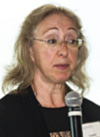 Day Two of the Boot Camp opened with a working breakfast at the United States Mission to the United Nations with a briefing on the United States Role in the United Nations by Laurie Shestak Phipps, a Senior Advisor at USUN. Ms Phipps spoke of her work as an adviser to ten US ambassadors to the United Nations over the past two decades. In that capacity, she chaired the expert-level Security Council negotiations that resulted in the ground-breaking SC resolution 1820 that characterized sexual violence as a tactic of war, and resolution 1888 that established the office of the Special Representative of the UN Secretary General (SRSG) on sexual violence in situations of armed conflict. Since 1989, she has covered gender and other social issues, including Indigenous Issues, ageing, and persons with disabilities, in the General Assembly, Security Council, Economic and Social Council and the Third Committee. Her work at the Commission on the Status of Women (CSW) negotiations on Early Forced Marriage and on Maternal Mortality, led to the first UN resolution condemning rape in 2012. She has also advised the Mission on the importance of women’s political participation in UN activities. During the Q&A session, Ms. Phipps addressed several issues of the participants including the US position regarding Syria, and UN and Security Council reform.
Day Two of the Boot Camp opened with a working breakfast at the United States Mission to the United Nations with a briefing on the United States Role in the United Nations by Laurie Shestak Phipps, a Senior Advisor at USUN. Ms Phipps spoke of her work as an adviser to ten US ambassadors to the United Nations over the past two decades. In that capacity, she chaired the expert-level Security Council negotiations that resulted in the ground-breaking SC resolution 1820 that characterized sexual violence as a tactic of war, and resolution 1888 that established the office of the Special Representative of the UN Secretary General (SRSG) on sexual violence in situations of armed conflict. Since 1989, she has covered gender and other social issues, including Indigenous Issues, ageing, and persons with disabilities, in the General Assembly, Security Council, Economic and Social Council and the Third Committee. Her work at the Commission on the Status of Women (CSW) negotiations on Early Forced Marriage and on Maternal Mortality, led to the first UN resolution condemning rape in 2012. She has also advised the Mission on the importance of women’s political participation in UN activities. During the Q&A session, Ms. Phipps addressed several issues of the participants including the US position regarding Syria, and UN and Security Council reform.
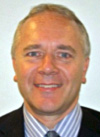 John Ericson, Chief of the Outreach Unit at the United Nations Office of Human Resources Management then discussed many different paths to a career with the United Nations. Mr. Ericson shared insight and experience of over 30 years’ work with United Nations in New York, Yugoslavia, Bangkok, and Nairobi, where he worked on economic commissions, peacekeeping operations, and social affairs. Mr. Ericson encouraged students to explore the possibilities of working with current aid programs and offered methods of becoming involved in international work, including, the UN Young Professionals Program (YPP), UN Volunteers Program, as well as Language Competitive Examination and employment through individual and general vacancies, and internships. Continuing with the briefing’s emphasis on careers at the United Nations, Mr. Ericson, spoke about political and peacebuilding missions headed by sixteen separate departments of peacekeeping operations, such as UNMIK (United Nations Mission in Kosovo) as great opportunities to enter the UN system.
John Ericson, Chief of the Outreach Unit at the United Nations Office of Human Resources Management then discussed many different paths to a career with the United Nations. Mr. Ericson shared insight and experience of over 30 years’ work with United Nations in New York, Yugoslavia, Bangkok, and Nairobi, where he worked on economic commissions, peacekeeping operations, and social affairs. Mr. Ericson encouraged students to explore the possibilities of working with current aid programs and offered methods of becoming involved in international work, including, the UN Young Professionals Program (YPP), UN Volunteers Program, as well as Language Competitive Examination and employment through individual and general vacancies, and internships. Continuing with the briefing’s emphasis on careers at the United Nations, Mr. Ericson, spoke about political and peacebuilding missions headed by sixteen separate departments of peacekeeping operations, such as UNMIK (United Nations Mission in Kosovo) as great opportunities to enter the UN system.
 The next speaker was Matthias Klettermayer, Sustainable Development Officer at the United Nations Department of Social and Economic Affairs, who briefed the group on the United Nations Sustainable Development Goals. Mr. Klettermayer first provided a brief history of the UN charter and illuminated the fact that at the time of its signing, the UN charter did not include goals for sustained development. Mr. Klettermayer discussed the United Nation’s Millennium Development Goals and the future implementation of Sustainable Development Goals or SDGs – a set of goals which were agreed upon at the Rio+20 Conference in 2012. The Sustainable Development Goals will build upon the Millennium Development Goals for the Post-2015 development agenda. The SDGs are a collection of 17 goals designed to address some of the world’s key issues – Sustainable Development Goals and targets. The question now is how UN member states can work together to finance the post-2015 SDGs. One estimate puts the cost of the project at a whopping 33 trillion dollars. In addition to this financial challenge, Mr. Klettermayer remarked that violent conflict is one of the greatest obstacles of sustained development. As an example, he cited that the civil war in Syria has undone 35 years of development in the past 4 years.
The next speaker was Matthias Klettermayer, Sustainable Development Officer at the United Nations Department of Social and Economic Affairs, who briefed the group on the United Nations Sustainable Development Goals. Mr. Klettermayer first provided a brief history of the UN charter and illuminated the fact that at the time of its signing, the UN charter did not include goals for sustained development. Mr. Klettermayer discussed the United Nation’s Millennium Development Goals and the future implementation of Sustainable Development Goals or SDGs – a set of goals which were agreed upon at the Rio+20 Conference in 2012. The Sustainable Development Goals will build upon the Millennium Development Goals for the Post-2015 development agenda. The SDGs are a collection of 17 goals designed to address some of the world’s key issues – Sustainable Development Goals and targets. The question now is how UN member states can work together to finance the post-2015 SDGs. One estimate puts the cost of the project at a whopping 33 trillion dollars. In addition to this financial challenge, Mr. Klettermayer remarked that violent conflict is one of the greatest obstacles of sustained development. As an example, he cited that the civil war in Syria has undone 35 years of development in the past 4 years.
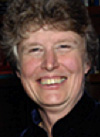 For the last session on Tuesday, the group travelled to the offices of the Wildlife Conservation Society at the Central Park Zoo for a briefing on international conservation efforts by Dr. Elizabeth Bennett, the Vice President for Species Conservation at WCS. HDI Board Member and WCS Fellow, Deborah Landey also assisted in the presentation. Dr. Bennett’s presentation began with startling statistics on the ivory trade and the African elephant population decline. From some 1.2 million in 1980 to about 420,000 in 2012, elephants are on the verge of extinction in the wild in our life time if nothing is done to stem the trade in ivory and other elephant products. WCS has devoted much time and effort to stopping the demand for ivory through education programs aimed mainly at Asian countries which are the chief importers of ivory products. A majority of illegal ivory ends up as trinkets and carvings for buyers in East Asia – jewelry, chopsticks, bookmarks, and elaborate artwork. But the demand for these goods is not restricted to the Far East, in fact illegal ivory markets thrive across the globe. Boot Camp participant Thomas Hu of China stated, “I am really very ashamed by what I and the people from my country have done. I will share what I have learned here with all of my friends and family when I return to China. No market, no killing.” After the briefing, participants were able to tour the Central Park Zoo courtesy of the Wildlife Conservation Society.
For the last session on Tuesday, the group travelled to the offices of the Wildlife Conservation Society at the Central Park Zoo for a briefing on international conservation efforts by Dr. Elizabeth Bennett, the Vice President for Species Conservation at WCS. HDI Board Member and WCS Fellow, Deborah Landey also assisted in the presentation. Dr. Bennett’s presentation began with startling statistics on the ivory trade and the African elephant population decline. From some 1.2 million in 1980 to about 420,000 in 2012, elephants are on the verge of extinction in the wild in our life time if nothing is done to stem the trade in ivory and other elephant products. WCS has devoted much time and effort to stopping the demand for ivory through education programs aimed mainly at Asian countries which are the chief importers of ivory products. A majority of illegal ivory ends up as trinkets and carvings for buyers in East Asia – jewelry, chopsticks, bookmarks, and elaborate artwork. But the demand for these goods is not restricted to the Far East, in fact illegal ivory markets thrive across the globe. Boot Camp participant Thomas Hu of China stated, “I am really very ashamed by what I and the people from my country have done. I will share what I have learned here with all of my friends and family when I return to China. No market, no killing.” After the briefing, participants were able to tour the Central Park Zoo courtesy of the Wildlife Conservation Society.
Day Three
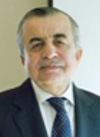 Wednesday’s activities began with a working breakfast at the National Arts Club with Ambassador Zahir Tanin, the Permanent Representative of the Islamic Republic of Afghanistan to the United Nations, who spoke on his time at the UN since 2006 and the various activities the Mission has been involved in, including climate change, Security Council reform, presidency of the General Assembly, the rights of the Palestinian people, and the illicit trade in small arms and light weapons. The Ambassador went on to praise the United Nations for its activities in Afghanistan. The United Nations has assisted in the repatriation of refugees and has provided humanitarian aid such as health care, educational programs, and food and has supported mine-clearing operations. The United Nations Development Programme and associated agencies have undertaken numerous development projects. He especially pointed out the United Nations Assistance Mission in Afghanistan (UNAMA). UNAMA is a political UN mission established at the request of the Government of Afghanistan to assist it and the people of Afghanistan in laying the foundations for sustainable peace and development. UNAMA was established on 28 March 2002 and coordinates international civilian efforts in assisting the South Asian nation in reinforcing Afghan sovereignty, leadership and ownership. There are currently nearly 30 UN agencies with a presence in Afghanistan.
Wednesday’s activities began with a working breakfast at the National Arts Club with Ambassador Zahir Tanin, the Permanent Representative of the Islamic Republic of Afghanistan to the United Nations, who spoke on his time at the UN since 2006 and the various activities the Mission has been involved in, including climate change, Security Council reform, presidency of the General Assembly, the rights of the Palestinian people, and the illicit trade in small arms and light weapons. The Ambassador went on to praise the United Nations for its activities in Afghanistan. The United Nations has assisted in the repatriation of refugees and has provided humanitarian aid such as health care, educational programs, and food and has supported mine-clearing operations. The United Nations Development Programme and associated agencies have undertaken numerous development projects. He especially pointed out the United Nations Assistance Mission in Afghanistan (UNAMA). UNAMA is a political UN mission established at the request of the Government of Afghanistan to assist it and the people of Afghanistan in laying the foundations for sustainable peace and development. UNAMA was established on 28 March 2002 and coordinates international civilian efforts in assisting the South Asian nation in reinforcing Afghan sovereignty, leadership and ownership. There are currently nearly 30 UN agencies with a presence in Afghanistan.
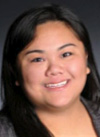 After travelling from New York City to Washington, DC, the participants received briefings from both current and former US Department of State speakers. Cameo Cheung, Recruitment & Public Affairs Specialist in the Office of Academic Exchange Programs, Bureau of Educational and Cultural Affairs at the US State Department, shared the full range of Fulbright programming available through her office. The Fulbright Program operates in more than 155 countries worldwide and has provided approximately 310,000 participants with the opportunity to study, teach, or conduct research in each others’ countries and exchange ideas. Approximately 8,000 competitive, merit-based grants are awarded annually in most academic disciplines and fields of study, and Ms. Cheung related the myriad of ways that both foreign and US students can participate both in their home countries and the US.
After travelling from New York City to Washington, DC, the participants received briefings from both current and former US Department of State speakers. Cameo Cheung, Recruitment & Public Affairs Specialist in the Office of Academic Exchange Programs, Bureau of Educational and Cultural Affairs at the US State Department, shared the full range of Fulbright programming available through her office. The Fulbright Program operates in more than 155 countries worldwide and has provided approximately 310,000 participants with the opportunity to study, teach, or conduct research in each others’ countries and exchange ideas. Approximately 8,000 competitive, merit-based grants are awarded annually in most academic disciplines and fields of study, and Ms. Cheung related the myriad of ways that both foreign and US students can participate both in their home countries and the US.
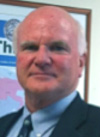 James Lawrence, former Director of the Office of Weapons Removal and Abatement in the Bureau of Political-Military Affairs (PM/WRA) of the US State Department spoke with participants on his experiences in living an “international life” for the past 40 years beginning as a Peace Corps Volunteer and staffer and moving to his time as Executive Director of the Bureau of Population, Refugees, and Migration from 1980 to 1996. This $700 million program admits 75,000 refugees to the United States each year and provides support for another 20 million refugees through contributions to the United Nations and other international organizations. He was particularly proud of his management of the US governments program to clear landmines and other explosive remnants of war; curb the illicit trade in small arms and light weapons; and reduce the threat from aging and unstable munitions. But what really struck a chord with the participants were his remarks on leadership and his very candid assessment on present US foreign policy. Mr. Lawrence stated that, “it felt good to be ‘back in the game’ doing something useful and meaningful with young people and making some use of the experience I spent 40 years collecting.”
James Lawrence, former Director of the Office of Weapons Removal and Abatement in the Bureau of Political-Military Affairs (PM/WRA) of the US State Department spoke with participants on his experiences in living an “international life” for the past 40 years beginning as a Peace Corps Volunteer and staffer and moving to his time as Executive Director of the Bureau of Population, Refugees, and Migration from 1980 to 1996. This $700 million program admits 75,000 refugees to the United States each year and provides support for another 20 million refugees through contributions to the United Nations and other international organizations. He was particularly proud of his management of the US governments program to clear landmines and other explosive remnants of war; curb the illicit trade in small arms and light weapons; and reduce the threat from aging and unstable munitions. But what really struck a chord with the participants were his remarks on leadership and his very candid assessment on present US foreign policy. Mr. Lawrence stated that, “it felt good to be ‘back in the game’ doing something useful and meaningful with young people and making some use of the experience I spent 40 years collecting.”
Day Four
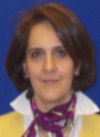 Thursday morning, June 11, brought the Boot Camp participants to the offices of the United Nations Information Centre (UNIC) in Washington, DC for briefings from UNIC, the United Nations Development Programme, and the UN High Commissioner for Refugees. Stefania Pifanelli, Deputy Director of the UNIC office in Washington, related that as the United Nations’ office in the nations capital, the UN Information Center serves as the focal point for UN news and information to advance understanding of the UN and its work, and serves as a resource for United States government officials, NGOs, civil-society organizations and the American people. The network of 63 United Nations Information Centres in important national capitals around the world are key to the UN’s ability to reach the peoples of the world and to share the United Nations story with them in their native languages. These centres, working in coordination with the UN system, reach out to media and educational institutions, engage in partnerships with governments, local civil society organizations and the private sector, and maintain libraries and electronic information resources. She went on state one of her main jobs at UNIC was engagement with the US Congress as the US is the biggest contributor to the UN.
Thursday morning, June 11, brought the Boot Camp participants to the offices of the United Nations Information Centre (UNIC) in Washington, DC for briefings from UNIC, the United Nations Development Programme, and the UN High Commissioner for Refugees. Stefania Pifanelli, Deputy Director of the UNIC office in Washington, related that as the United Nations’ office in the nations capital, the UN Information Center serves as the focal point for UN news and information to advance understanding of the UN and its work, and serves as a resource for United States government officials, NGOs, civil-society organizations and the American people. The network of 63 United Nations Information Centres in important national capitals around the world are key to the UN’s ability to reach the peoples of the world and to share the United Nations story with them in their native languages. These centres, working in coordination with the UN system, reach out to media and educational institutions, engage in partnerships with governments, local civil society organizations and the private sector, and maintain libraries and electronic information resources. She went on state one of her main jobs at UNIC was engagement with the US Congress as the US is the biggest contributor to the UN.
 Leanne Rios, Communications Specialist at the United Nations Development Programme (UNDP) then gave an introduction to the work of UNDP around the world, using the three main focus areas of sustainable development, democratic governance and peacebuilding, and climate and disaster resilience. Between each area there are several cross cutting issues that UNDP deals with such as development planning and inclusive sustainable growth (including livelihood development and addressing income inequality), economic recovery, gender equality, institution building (including local governance and stemming corruption), rule of law, justice and security (including human rights and sexual and gender-based violence), inclusive political processes (including women’s political participation and electoral reform), youth empowerment, HIV and health (including other non-communicable diseases), sustainable energy, and climate change mitigation strategies. So large is UNDP’s reach in several of these areas that they do more work on gender than UN Women, more work on climate change than the UN Environment Programme, and more work on HIV than UNAIDS. Not only is UNDP addressing these issues on a grassroots level, but their works also informs policy on local, national and international levels. Ms. Rios’s passion was very evident in her presentation to the point that she received the highest evaluation from the participants of any speaker during the Boot Camp.
Leanne Rios, Communications Specialist at the United Nations Development Programme (UNDP) then gave an introduction to the work of UNDP around the world, using the three main focus areas of sustainable development, democratic governance and peacebuilding, and climate and disaster resilience. Between each area there are several cross cutting issues that UNDP deals with such as development planning and inclusive sustainable growth (including livelihood development and addressing income inequality), economic recovery, gender equality, institution building (including local governance and stemming corruption), rule of law, justice and security (including human rights and sexual and gender-based violence), inclusive political processes (including women’s political participation and electoral reform), youth empowerment, HIV and health (including other non-communicable diseases), sustainable energy, and climate change mitigation strategies. So large is UNDP’s reach in several of these areas that they do more work on gender than UN Women, more work on climate change than the UN Environment Programme, and more work on HIV than UNAIDS. Not only is UNDP addressing these issues on a grassroots level, but their works also informs policy on local, national and international levels. Ms. Rios’s passion was very evident in her presentation to the point that she received the highest evaluation from the participants of any speaker during the Boot Camp.
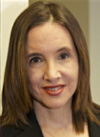 The United Nations High Commissioner for Refugees (UNHCR) Senior Advisor for External Relations and Government Affairs, Jana Mason next briefed the participants on the work of UNHCR and the context under which it operates to provide protection to vulnerable displaced populations. International protocols govern the responsibility of states to protect not only its own citizens but also those with refugee status. UNHCR is mandated to lead and co-ordinate international action to protect refugees and resolve refugee problems worldwide. Its primary purpose is to safeguard the rights and well-being of refugees. Ms. Mason said that UNHCR strives to ensure that everyone can exercise the right to seek asylum and find safe refuge in another State, with the option to return home voluntarily, integrate locally or to resettle in a third country. Since its inception in 1950, the agency has helped tens of millions of people restart their lives. Presently, a staff of more than 9,300 people in 123 countries continues to help and protect millions of refugees, returnees, internally displaced and stateless people. She then went on to briefly discuss how UNHCR works to protect and aid refugees in responding to emergencies, the alternatives to camps (when there is one), its work to minimize the environmental impact of refugees, and work toward durable solutions to refugee crises.
The United Nations High Commissioner for Refugees (UNHCR) Senior Advisor for External Relations and Government Affairs, Jana Mason next briefed the participants on the work of UNHCR and the context under which it operates to provide protection to vulnerable displaced populations. International protocols govern the responsibility of states to protect not only its own citizens but also those with refugee status. UNHCR is mandated to lead and co-ordinate international action to protect refugees and resolve refugee problems worldwide. Its primary purpose is to safeguard the rights and well-being of refugees. Ms. Mason said that UNHCR strives to ensure that everyone can exercise the right to seek asylum and find safe refuge in another State, with the option to return home voluntarily, integrate locally or to resettle in a third country. Since its inception in 1950, the agency has helped tens of millions of people restart their lives. Presently, a staff of more than 9,300 people in 123 countries continues to help and protect millions of refugees, returnees, internally displaced and stateless people. She then went on to briefly discuss how UNHCR works to protect and aid refugees in responding to emergencies, the alternatives to camps (when there is one), its work to minimize the environmental impact of refugees, and work toward durable solutions to refugee crises.
 The group then travelled to the Heritage Foundation for a working lunch with Ted Bromund, Senior Research Fellow in the Foundation’s Davis Institute of National Security and Foreign Policy. The Heritage Foundation is a think tank whose mission is to formulate and promote conservative public policies based on the principles of free enterprise, limited government, individual freedom, traditional American values, and a strong national defense. Dr. Bromund stated that the Foundation’s view of the UN is that, to be useful, the UN must carry out its responsibilities competently. The current organization falls very short. The United States should not hesitate to demand reforms intended to improve the organization. The cost of failing to reform the UN is high, not just for the UN, which risks being sidelined if it cannot be relied upon to address key issues, but also for the United States, which would be forced to expend greater resources and effort to resolve problems, such as the recent Ebola outbreak in West Africa which was poorly addressed by the World Health Organization, that should normally fall under the responsibility of the UN. As expected, this brought impassioned responses from the participants and led to a robust discussion on the usefulness of the UN in general.
The group then travelled to the Heritage Foundation for a working lunch with Ted Bromund, Senior Research Fellow in the Foundation’s Davis Institute of National Security and Foreign Policy. The Heritage Foundation is a think tank whose mission is to formulate and promote conservative public policies based on the principles of free enterprise, limited government, individual freedom, traditional American values, and a strong national defense. Dr. Bromund stated that the Foundation’s view of the UN is that, to be useful, the UN must carry out its responsibilities competently. The current organization falls very short. The United States should not hesitate to demand reforms intended to improve the organization. The cost of failing to reform the UN is high, not just for the UN, which risks being sidelined if it cannot be relied upon to address key issues, but also for the United States, which would be forced to expend greater resources and effort to resolve problems, such as the recent Ebola outbreak in West Africa which was poorly addressed by the World Health Organization, that should normally fall under the responsibility of the UN. As expected, this brought impassioned responses from the participants and led to a robust discussion on the usefulness of the UN in general.
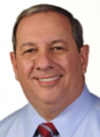 The last session on Thursday was at the United States Institute of Peace. George Lopez, Vice President of the Academy for International Conflict Management and Peacebuilding addressed the group and explained that USIP is is an independent, nonpartisan institution established and funded by Congress to increase the nation’s capacity to manage international conflict without violence. They accomplish this through education and training programs of the Academy for International Conflict Management and Peacebuilding. USIP programs are designed for practitioners in governments, international organizations, non-profit organizations, and the private sector to build and strengthen the skills required for managing conflict in all its phases, from preventing conflict to post-conflict peacebuilding. Mr. Lopez explained that USIP equips US and international civilian, military, and nongovernmental practitioners with the skills for effective peacebuilding; provides decision-makers with the understanding and tools for crafting sound policies for conflict management and peacebuilding; gives government officials and civil society leaders in zones of conflict the skills, tools, and practice to build peace, and; strengthens the capacity of educational institutions and civil society organizations to prepare future conflict managers and peacebuilders. Participants were hosted by HDI Board Member Dr. Al Khalafalla that evening at a special dinner where Dr. Khalafalla spoke on his work with HDI and various other NGOs, followed by a night tour of the Lincoln, Jefferson and Martin Luther King, Jr., memorials on the National Mall.
The last session on Thursday was at the United States Institute of Peace. George Lopez, Vice President of the Academy for International Conflict Management and Peacebuilding addressed the group and explained that USIP is is an independent, nonpartisan institution established and funded by Congress to increase the nation’s capacity to manage international conflict without violence. They accomplish this through education and training programs of the Academy for International Conflict Management and Peacebuilding. USIP programs are designed for practitioners in governments, international organizations, non-profit organizations, and the private sector to build and strengthen the skills required for managing conflict in all its phases, from preventing conflict to post-conflict peacebuilding. Mr. Lopez explained that USIP equips US and international civilian, military, and nongovernmental practitioners with the skills for effective peacebuilding; provides decision-makers with the understanding and tools for crafting sound policies for conflict management and peacebuilding; gives government officials and civil society leaders in zones of conflict the skills, tools, and practice to build peace, and; strengthens the capacity of educational institutions and civil society organizations to prepare future conflict managers and peacebuilders. Participants were hosted by HDI Board Member Dr. Al Khalafalla that evening at a special dinner where Dr. Khalafalla spoke on his work with HDI and various other NGOs, followed by a night tour of the Lincoln, Jefferson and Martin Luther King, Jr., memorials on the National Mall.
Day Five
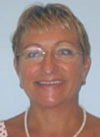 The final day of the Boot Camp saw the participants split into two groups for the morning sessions. The first group went to the Headquarters of the Central Intelligence Agency. There they received a tour of the CIA Museum with an emphasis on how intelligence shapes international diplomacy efforts. The second group received a briefing at the Pan American Health Organization, which is the regional office of the World Health Organization for the Americas from Donne Eberwine-Villagran, Public Information Officer at PAHO, and Dr. Maria Montiero, Senior Advisor (pictured). Ms. Eberwine-Villagran stated that PAHO was founded in 1902, and is the world’s oldest international public health agency. It provides technical cooperation and mobilizes partnerships to improve health and quality of life in the countries of the Americas. PAHO serves as the Regional Office for the Americas of the World Health Organization (WHO). Together with WHO, PAHO is a member of the United Nations system. Dr. Montiero’s presentation was on her work on the effects of excessive alcohol consumption in low income countries in the Americas and how these effects can be mitigated with educational and rehabilitation programs.
The final day of the Boot Camp saw the participants split into two groups for the morning sessions. The first group went to the Headquarters of the Central Intelligence Agency. There they received a tour of the CIA Museum with an emphasis on how intelligence shapes international diplomacy efforts. The second group received a briefing at the Pan American Health Organization, which is the regional office of the World Health Organization for the Americas from Donne Eberwine-Villagran, Public Information Officer at PAHO, and Dr. Maria Montiero, Senior Advisor (pictured). Ms. Eberwine-Villagran stated that PAHO was founded in 1902, and is the world’s oldest international public health agency. It provides technical cooperation and mobilizes partnerships to improve health and quality of life in the countries of the Americas. PAHO serves as the Regional Office for the Americas of the World Health Organization (WHO). Together with WHO, PAHO is a member of the United Nations system. Dr. Montiero’s presentation was on her work on the effects of excessive alcohol consumption in low income countries in the Americas and how these effects can be mitigated with educational and rehabilitation programs.
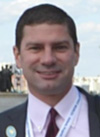 The participants then regrouped on Capitol Hill in the US House of Representatives Committee on Foreign Affairs Hearing Chambers in the Rayburn House Office Building where they were treated to an impromptu chat with Congressman Mark Sanford (R-SC) who spoke about the recent trade deal that just cleared the House and it implications. The group then heard from Mark Walker, Majority Staff Director of the Western Hemisphere Affairs Sub-Committee (pictured left), and Eric Jacobstein,
The participants then regrouped on Capitol Hill in the US House of Representatives Committee on Foreign Affairs Hearing Chambers in the Rayburn House Office Building where they were treated to an impromptu chat with Congressman Mark Sanford (R-SC) who spoke about the recent trade deal that just cleared the House and it implications. The group then heard from Mark Walker, Majority Staff Director of the Western Hemisphere Affairs Sub-Committee (pictured left), and Eric Jacobstein, 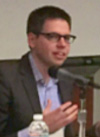 Senior Policy Advisor to the House Committee on Foreign Affairs Democratic Staff (pictured right). Mr. Walker spoke on the congressional perspective on international affairs and diplomacy and how the Committee and Congress work to keep the UN accountable as the US is the largest contributor of funding. Mr. Jacobstein then went on to explain that the Committee is responsible for oversight and legislation relating to foreign assistance (including development assistance); national security developments affecting foreign policy; war powers, treaties, executive agreements, and the deployment and use of United States Armed Forces; arms control and disarmament issues; international law; promotion of democracy, and peacekeeping, peace enforcement, and enforcement of United Nations or other international sanctions.
Senior Policy Advisor to the House Committee on Foreign Affairs Democratic Staff (pictured right). Mr. Walker spoke on the congressional perspective on international affairs and diplomacy and how the Committee and Congress work to keep the UN accountable as the US is the largest contributor of funding. Mr. Jacobstein then went on to explain that the Committee is responsible for oversight and legislation relating to foreign assistance (including development assistance); national security developments affecting foreign policy; war powers, treaties, executive agreements, and the deployment and use of United States Armed Forces; arms control and disarmament issues; international law; promotion of democracy, and peacekeeping, peace enforcement, and enforcement of United Nations or other international sanctions.
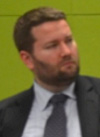 The final session of the Boot Camp took place at the US Department of State Headquarters where the participants were briefed by Nick Sadoski of the Bureau of International Organization Affairs. Mr. Sadoski explained that the Bureau is the US Government’s primary conduit with the United Nations and a host of other international agencies and organizations. As such, the Bureau is charged with advancing the Administration’s vision of strong multilateral engagement as a crucial tool in advancing US national interests. US multilateral engagement spans the full range of important global issues, including peace and security, nuclear nonproliferation, human rights, economic development, climate change, global health, and much more. Mr. Sadoski then explained the various ways that people enter employment at the State Department, either as Foreign Service Officers (FSO), or as a civil service employee. He also spoke of the several different opportunities there are for internships and employment both at overseas posts such as embassies and consulates and at the State Department offices in Washington, DC.
The final session of the Boot Camp took place at the US Department of State Headquarters where the participants were briefed by Nick Sadoski of the Bureau of International Organization Affairs. Mr. Sadoski explained that the Bureau is the US Government’s primary conduit with the United Nations and a host of other international agencies and organizations. As such, the Bureau is charged with advancing the Administration’s vision of strong multilateral engagement as a crucial tool in advancing US national interests. US multilateral engagement spans the full range of important global issues, including peace and security, nuclear nonproliferation, human rights, economic development, climate change, global health, and much more. Mr. Sadoski then explained the various ways that people enter employment at the State Department, either as Foreign Service Officers (FSO), or as a civil service employee. He also spoke of the several different opportunities there are for internships and employment both at overseas posts such as embassies and consulates and at the State Department offices in Washington, DC.
The final Boot Camp activity was a Farewell Dinner where the participants were able to share their experiences with each other and invited guests. Each participant then received a Certificate of Completion from the Institute.
